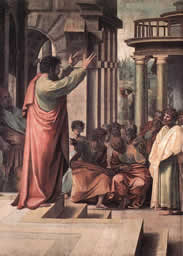Homilies, Sermons & Treatises
Sermons at Ascension and Saint Agnes
Link to sermons by liturgical year:
2005 | 2006 | 2007 | 2008 | 2009 | 2010 | 2011| 2012
On Homilies*
The New Advent Catholic Encyclopedia says, 'The word homily is derived from the Greek word homilia (from homilein), which means to have communion or hold intercourse with a person. In this sense homilia is used in I Cor., xv, 33. In Luke, xxiv, 14, we find the word homiloun, and in Acts, xxiv, 26, homilei, both used in the sense of "speaking with". In Acts, xx, 11, we meet the term homilesas; here it is used, for the first time, to signify a sermon to the Christians in connexion with the breaking of bread: it was evidently an informal discourse, or exposition of doctrine, for we are told that St. Paul "talked a long time . . . until daylight". Thereafter the word was used as a sign of Christian worship (Justin, "Apol. I", c. lxvii; Ignatius, "Ep. ad Polyc.", v). Origen was the first to distinguish between logos (sermo) and homilia (tractatus). Since Origen's time homily has meant, and still means, a commentary, without formal introduction, division, or conclusion, on some part of Sacred Scripture, the aim being to explain the literal, and evolve the spiritual, meaning of the Sacred Text. The latter, as a rule, is the more important; but if, as in the case of Origen, more attention be paid to the former, the homily will be called expository rather than moral or hortatory. It is the oldest form of preaching. Christ himself may be said, but with a difference to be noted later, to have preached in this style (cf. Luke 4:16-20). It was the kind of preaching that was used by the Apostles and Fathers in addressing the faithful.'
*From the New Advent Catholic Encyclopedia. Read the complete article >
Links to Selected Historical Sermons & Treatises
St. John Chrysostom
- The Easter Sermon
- Instructions to Catechumens
- Homilies on the Gospel of John
- Homilies on the Epistle to the Hebrews
- Homilies on the Acts of the Apostles
- Homilies on the Epistle to the Romans
Richard Hooker
John Henry Cardinal Newman

